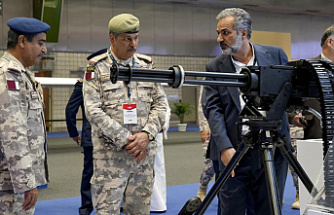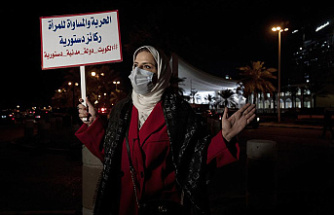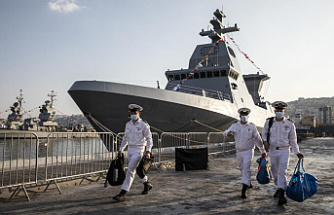The Biden administration's handling Russia's threat position in Ukraine is simple. It's not like Afghanistan.
As they attempt to prevent Russian President Vladimir Putin's invasion of Ukraine, President Joe Biden and his aides have engaged in strong diplomacy with Congress, other countries and the American people.
Biden often addresses the issue publicly, even though it is fluid. His diplomats were engaged with NATO countries as well as allies outside of the region, like Japan. This may have helped to reduce Putin's leverage. Members of Congress have also received briefings from high-ranking officials in the administration.
This response contrasts with the last fall's Afghanistan handling, when critics said the administration should have warned Americans about the worst-case scenarios -- including the possibility of a quick Taliban takeover, however remote that seemed to the White House.
"Not having that conversation [with the American public] probably left us ill-prepared what happened in August last year, the Fall of Kabul," stated Rep. Ami Bera (D-Calif.), who sits on Committee on Foreign Affairs. "This time around, you're watching the president speak on TV, as well his Cabinet members, which I believe prepared us for what happened in August of last year, the fall of Kabul," said Rep. Ami Bera, D-Calif., who sits on the Committee on Foreign Affairs.
Biden's administration official, who defended the Afghanistan response, said that it was based on the best intelligence and a promise made by the Afghan president that he would fight for his country. However, that didn’t happen. Officials also denied the idea that the administration's handling last year of Afghanistan's exit is shaping its response in Eastern Europe.
The transparency efforts of the government are meant to alert Americans to the risks of Russia's buildup at Ukraine's borders and expose Russian disinformation.
Experts say that there are clear indications that Biden is learning from the lessons of 2014 when Russia annexed Crimea. Biden was also vice president at the time. Barack Obama, then-President, was criticised for not doing more to deter Putin. Biden warned Putin about the international repercussions and stiff sanctions if he invades.
"There is no doubt the Biden administration was aware of the criticism that emerged in the aftermath of the withdrawal of Afghanistan," stated David Rothkopf, a former Clinton administration official and author of "Running the World" (Running the World: the Inside Story of the National Security Council, the Architects of American Power). "I believe the administration said that it needed to move ahead of the public diplomacy aspect of this in a more effective way. '"
He said that the Ukrainian government communicated more effectively and frequently with the president, which pushed him and other top officials to address the public directly. He said that the best way to defeat Putin was to communicate with him via diplomatic channels.
P. Michael McKinley is a former diplomat and four-time Ambassador to Afghanistan. He said that the administration's handling the crisis has strengthened relationships with key partners.
McKinley, a former top advisor to Secretary of State Mike Pompeo said that the administration used the time to strengthen and intensify dialog with key NATO allies.
There is evidence that the White House has additional work to do in rebuilding trust between American partners and humanitarian advocates after Kabul fell. It was a shocking sight to see desperate Afghans holding onto planes as fell to their deaths. U.S. had to rush an evacuation that left behind Afghans fearing Taliban retaliation.
The United States was perceived as a betrayer by the military community for leaving behind those who helped them in the 20-year conflict. Members of Congress felt angry at the chaos created by Kabul's sudden fall, which also included dealing with an influx of emergency assistance requests from people seeking to leave the country.
New questions have emerged about the administration's missteps in Afghanistan months later. Two Washington Post reports have shed light on the indecisiveness of Biden's team during the build-up to Afghanistan's exit. also described a chaotic evacuation operation.
The administration's miscalculations in Afghanistan have caused additional skepticism, even as it continues to build its case against Russian aggression.
Jeremy Butler, the executive director of Iraq Veterans of America, stated that veterans groups are pushing for the administration to allow journalists to embed with troops based at places like Poland.
Although he acknowledged that there was a difference between the administration's approach towards Ukraine, Butler demanded "as much independent analysis and reporting as possible in this situation so that we don't completely rely on what the administration tells us."
Last week, Biden was at odds with humanitarian activists after he signed an executive directive that divided $7 billion in assets intended for Afghans among the nation and families of 9/11 victims. It served to remind Americans of the dire economic situation in Afghanistan since the Taliban took over.
In a statement, the White House stated that the sanctions were "designed to allow the funds to reach Afghanistan's people while keeping them away from the Taliban and other malicious actors." The United States has placed sanctions against the Taliban network and Haqqani network. This includes for activities that could threaten Americans' safety, such as taking our citizens hostage.
However, Vali Nasr was a senior advisor to the U.S. special rep for Afghanistan and Pakistan. She said that the executive orders erode the administration's credibility on the international stage.
According to Nasr, Afghans view it as: "First, they dumped us, and they left behind all of us who had worked with them." Nasr stated that they are also taking money from our pockets and giving it to someone else. It just doesn't look good.
Bera stated that the administration has done a better job in Ukraine than it did in Afghanistan with regards to preparing for and communicating the worst case scenario. This is helping to rebuild trust.
Bera stated that "certainly the people who were briefing us at Capitol Hill never once suggested that the Afghan government could be overthrown quickly," despite being repeatedly asked this question. "I believe that the strong, unambiguous response of Ukraine's democracy is what we needed in order to turn this corner.
Experts say that the strength of the U.S. response is in its ability project unity with NATO partners, and beyond. This sends a message not only to Putin but to the entire international community.
David Wade, former Secretary of State John Kerry's chief of staff, stated that communication with allies and partners was crucial to American strategy. You need an orchestra to play a diplomatic song that reaches the Kremlin. Not a single act. Putin's strategy is to exploit weakness in Western resolve. He wants to know if someone is singing from a different sheet. The number of phone calls the White House and State Department shared publicly underline cohesion and emphasize unity.
Evelyn Farkas was the Pentagon's deputy assistant secretary for Russia, Ukraine, and Eurasia under the Obama administration. She said that there were "lessons learned" from every time she dealt with Russia.
"I wouldn't necessarily compare it to the Afghanistan withdrawal, because this is so similar to how we dealt with Russia in 2014, and the same people were in that administration then."
Farkas stated that it was better for Biden to deter Putin. However, the most dangerous scenario for America and its standing in the world for the president would be for Putin to invade and the U.S. not to respond with a strong response.
She stated that "the risk is there" if he's not punished as promised. "Then, we would suffer because nobody else would pay attention except us, even the Russians."











